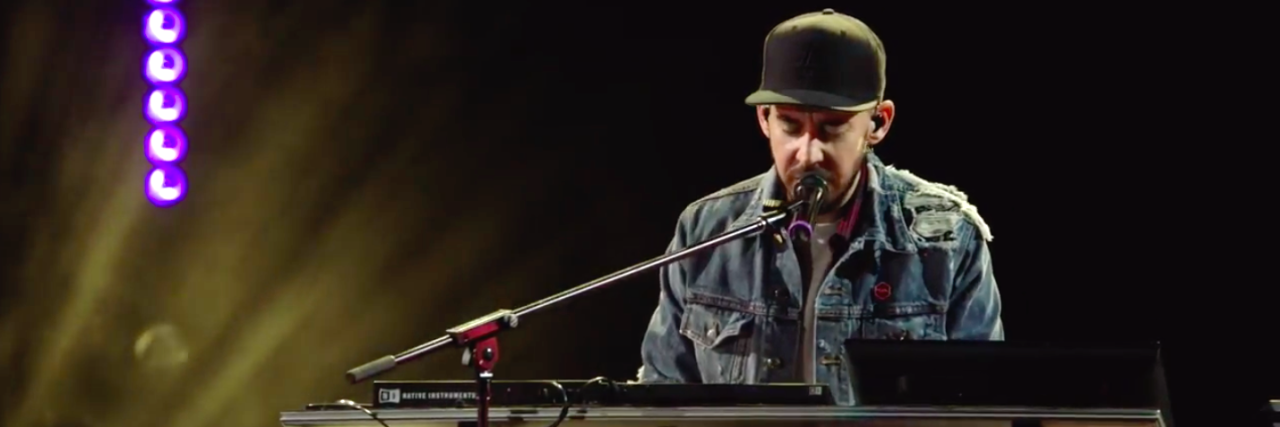On Friday night, Linkin Park held a memorial concert in honor of late bandmate Chester Bennington, who died by suicide in July. The concert, “Linkin Park and Friends Celebrate Life in Honor of Chester Bennington” at the Hollywood Bowl in Los Angeles, sold out its tickets and its livestream was viewed over two million times in less than 24 hours. (If you’d like to watch the three-hour concert, you can view it here.)
The night was an emotional one. With performances from a multitude of artists, including Blink-182, members of System of a Down, Kiiara and Machine Gun Kelly, many fans in the audience were in tears as they sang along to every word. But perhaps the most emotional part of the night was when frontman Mike Shinoda shared a song he had written eight days after Chester’s passing.
“Eventually I realized that one of the things that always helps me get through some things actually, [is] not only listening to music, but actually playing music… I sat down in my studio and I wrote something, and it was about eight days after. And I want to share it with you guys tonight, if that’s OK,” he told the audience.
The new song, called “Looking for an Answer,” came right after the band performed “One More Light,” the song now associated with Bennington’s passing.
Fans took to Twitter to express their love for “Looking for an Answer.”
I thought "One more light" was the most heartbreaking song ever made… but then Mike sang "Looking for an answer" #MakeChesterProud
— Martina Findus (@missfindus) October 28, 2017
Me while Mike was singing “Looking For An Answer”: pic.twitter.com/ep8wKwDs8x
— Natalia ???? (@natt_roth) October 28, 2017
This is the most beautiful song I've heard in months. Thank you, @mikeshinoda, you and @linkinpark #MakeChesterProudhttps://t.co/Ui50B0uoUh
— Yana ????????????Яна (@yanaxshhh) October 28, 2017
The song’s lyrics touch on a question many suicide loss survivors are familiar with: could I have done more?
The lyrics of the chorus are as follows,
Have I been lost all along
Was there something I could say or something I should not have done
Was I lost all along
Was I looking for an answer when there never really was one
Was I looking for an answer when there never really was one
In the aftermath of a loved one’s suicide, it’s normal to be “looking for an answer” and asking yourself if you could have done anything differently. According to the American Association of Suicidology, “survivors often struggle with the reasons why the suicide occurred and whether they should have done something to prevent the suicide or help their loved one. Feelings of guilt typically ensue if the survivor believes their loved one’s suicide could have been prevented.”
In some cases, suicide doesn’t always have an answer. Mighty contributor and suicide loss survivor Eve Singerman wrote about this sentiment whenever she hears the phrase, “suicide is preventable.”
When I hear this, it makes me feel like I’m being told there was something more I could have done. I feel blamed as the person who should have seen it coming, or should have been able to stop him. My constant doubts about whether one different decision could have saved my brother’s life plague me as it is, without hearing this phrase. All I ever wanted was to help. Hearing “suicide is preventable” feels like being told I failed… But the fact is, however many eerie signs there are now that this was in his future, he never let me or any of us ever know he feared this would happen, and I had no idea.
As she points out, some who are lost to suicide don’t always “look” like they are struggling. This is something Chester Bennington’s wife Talinda echoed when she shared a video of him laughing with his family. “This is what depression looked like to us,” she wrote. “He loves us so much & and we loved him.”
If you are struggling with the loss of a loved one to suicide, please know it is not your fault. There are resources for suicide loss survivors. If you are struggling and need help right now, call the National Suicide Prevention Lifeline at 1-800-273-8255.
Thank you, Mike Shinoda, for bravely putting your emotions on display and giving hope to so many people who are still struggling with the loss of Chester Bennington. We wish you and the Linkin Park family all the best.
If you or someone you know needs help, visit our suicide prevention resources page.
If you need support right now, call the National Suicide Prevention Lifeline at 1-800-273-8255, the Trevor Project at 1-866-488-7386 or text “HOME” to 741-741. Head here for a list of crisis centers around the world.

